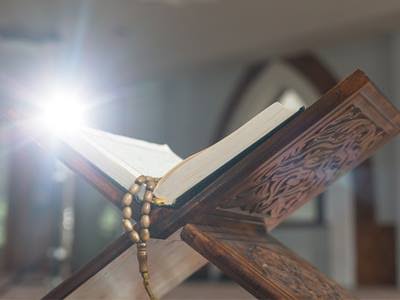Allah the Almighty says:
“The month of Ramadan in which was revealed the Qur’an, a guidance for mankind and clear proofs for the guidance and the criterion (between right and wrong)”
(Surah al-Baqarah:185)
The entire Qur’an was sent down from the ‘Preserved Tablet’ (al-Lauh al-Mahfoodh) to the heavens of the earth in the month of Ramadan. It was therefore, an honour for this month that the Qur’an should be revealed in it. For this reason the Prophet, peace and blessings of Allah be upon him, used to study the Qur’an with the Angel Jibreel during this blessed month. He used to listen to it and reflect on its meanings, recite it and live with its calls.
The person who reads the Qur’an whilst fasting combines Ramadan with the Glorious Qur’an. Those who reflect on its meanings, following the example of our blessed Prophet, fulfill the instruction of Allah:
“Will they not then ponder over this Qur’an? Or are there locks upon their hearts?”
(Surah Muhammad: 24)
The Qur’an was sent as a guidance to mankind, and as such we need to ponder over the guidance that it gives us. Ramadan is a blessed opportunity to do this as we focus all our efforts on the worship of our Creator. Ramadan is a time to contemplate the Quran’s revelation, its days of collective study, and the periods of attention devoted to it by our pious predecessors.
The Prophet, SallAllahu Alayhi Wa Sallam, once advised:
“Recite the Qur’an, it will be the intercessor for its companions. Recite the two luminous ones – al-Baqarah and Al-Imran – for on the Day of Resurrection they will come as two clouds or canopies [full of light], or as two flocks of birds in ranks, pleading for those who recite them.”
[Recorded in Muslim]
It is recorded in a hadith in al-Bukhari and Muslim, that those who recite the Qur’an expertly will be in the company of the righteous angles, whilst those who struggle will receive double the reward.
When Ramadan came, our righteous predecessors used to disengage themselves and set out on a spiritual journey with the Qur’an. It is said that when Ramadan came, Imam Malik would not preoccupy himself with anything except the Qur’an. He would suspend teaching and issuing legal rulings, pointing out that this was the month of the Qur’an.
When our predecessors recited the Qur’an, they understood its meanings and it moved their hearts. It was confirmed that Ibn Mas’ud once read the first part of Surah al Nisa for our Prophet, SallAllahu Alayhi Wa Sallam, until he reached the verse:
“How then [will the sinners fare on Judgement day] when We shall bring forward witnesses from within every community, and bring thee [O Prophet] as a witness against them?”
(Surah al Nisa:41)
The Prophet, SallAllahu Alayhi Wa Sallam, stopped him saying: “That is enough for now”. Ibn Mas’ud said that when he looked at the Prophet, his eyes were flowing with tears.
When the whims of later generations turned away from listening to the words of Allah, learning became distorted, dispositions were turned upside down and understandings became afflicted. When the Qur’an was substituted with other sources of guidance, corruption became common, calamities multiplied, understandings were thrown into disarray and fortitude disappeared. Surely the purpose of the Qur’an is to guide people to the Straight Path. It is a light and a remedy for the illnesses of the heart.
Will we not then live with the Qur’an in Ramadan and outside Ramadan? Will we not recognise the greatness of the Qur’an and fill our hearts with its happiness and radiance? Will we not do this?

